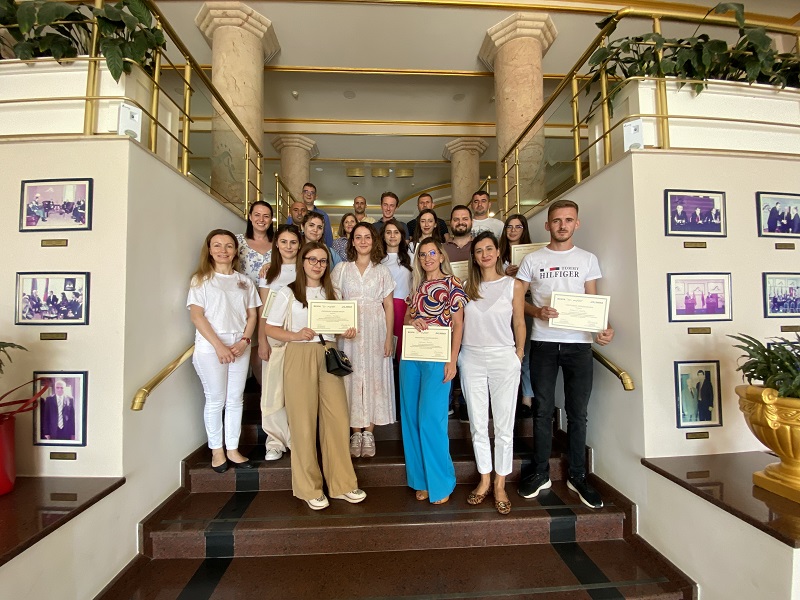On 18-19 July 2022, the Water Supply and Sewerage Association of Albania SHUKALB and Global Water Partnership-Mediterranean (GWP-Med) successfully organised a 2-day workshop on Wastewater Management in the Context of the Circular Economy in Tirana and Durres, Albania. Prepared and delivered by Ms. Elisabeta Poçi, Executive Director of SHUKALB, Prof. Enkelejda Gjinali, Department of Environmental Engineering, Polytechnic University of Tirana, and Arbana Kola, Project Manager, SHUKALB it was attended by young representatives from:
- Water Supply and Sewerage Companies of Pogradec, Shkoder, Korçe, Kukes
- The Municipality of Tirana;
- The National Agency for Water Supply, Sewerage and Waste Infrastructure (AKUM);
- The Water Regulatory Authority (ERRU);
- The Water Resources Management Agency (AMBU);
- The National Environment Agency (AKM);
- Global Water Partnership-Mediterranean (GWP-Med) and
- SHUKALB

Elisabeta Poçi, Executive Director of SHUKALB during the opening of the first day of the workshop © SHUKALB
Circular Economy and Wastewater Treatment Plants in Albania
The overall aim of the workshop was to train participants from the water supply and sanitation sector on the benefits of wastewater management in the context of circular economy. In Albania, both issues are still at quite early stages. The first wastewater treatment plant (WWTP) started operating in 2006 and today the country has 12 WWTPs, serving to around 13 % of the population. In most of them, the treated effluent is simply discharged in the receiving water bodies, as the final result of a long process of treatment that consumes substantial amounts of energy and chemicals. At the same time, there are few good examples that have started integrating circular economy concepts as part of their wastewater management, such as the WWTPs in Korca and in Durres.
The workshop
During the two-day workshop, participants learned about Circular Economy's (CE) general principles and benefits as well as how the proper management of wastewater can contribute to this model of business. The existing legal and policy frameworks at the national and EU level in favour of CE were presented along with many cases and examples of CE in practice, from developed countries as well as related initiatives in Albania.

Participants during their visit at the WWTP in Durres © SHUKALB
On the second day of the workshop, a field trip was organised to the Durres WWTP, where participants were introduced to its design and equipment and got acquainted with the operation and maintenance procedures. The WWTP in Durres is a good example, incorporating a constructed wetland to enhance the treatment process, utilising biogas from the digestion process to produce electricity, while treated water is used to irrigate crops for animal feed.
See the Workshop’s presentations and materials in the dedicated webpage here
The workshop was organised in the framework of the The SEE Nexus Project (“Promoting the Sustainable Management of Natural Resources in Southeastern Europe, through the use of the Nexus approach”) is financed by the Austrian Development Agency (ADA), the operational unit of Austrian Development Cooperation, and implemented by Global Water Partnership-Mediterranean (GWP-Med) in partnership with the United Nations Economic Commission for Europe (UNECE).
